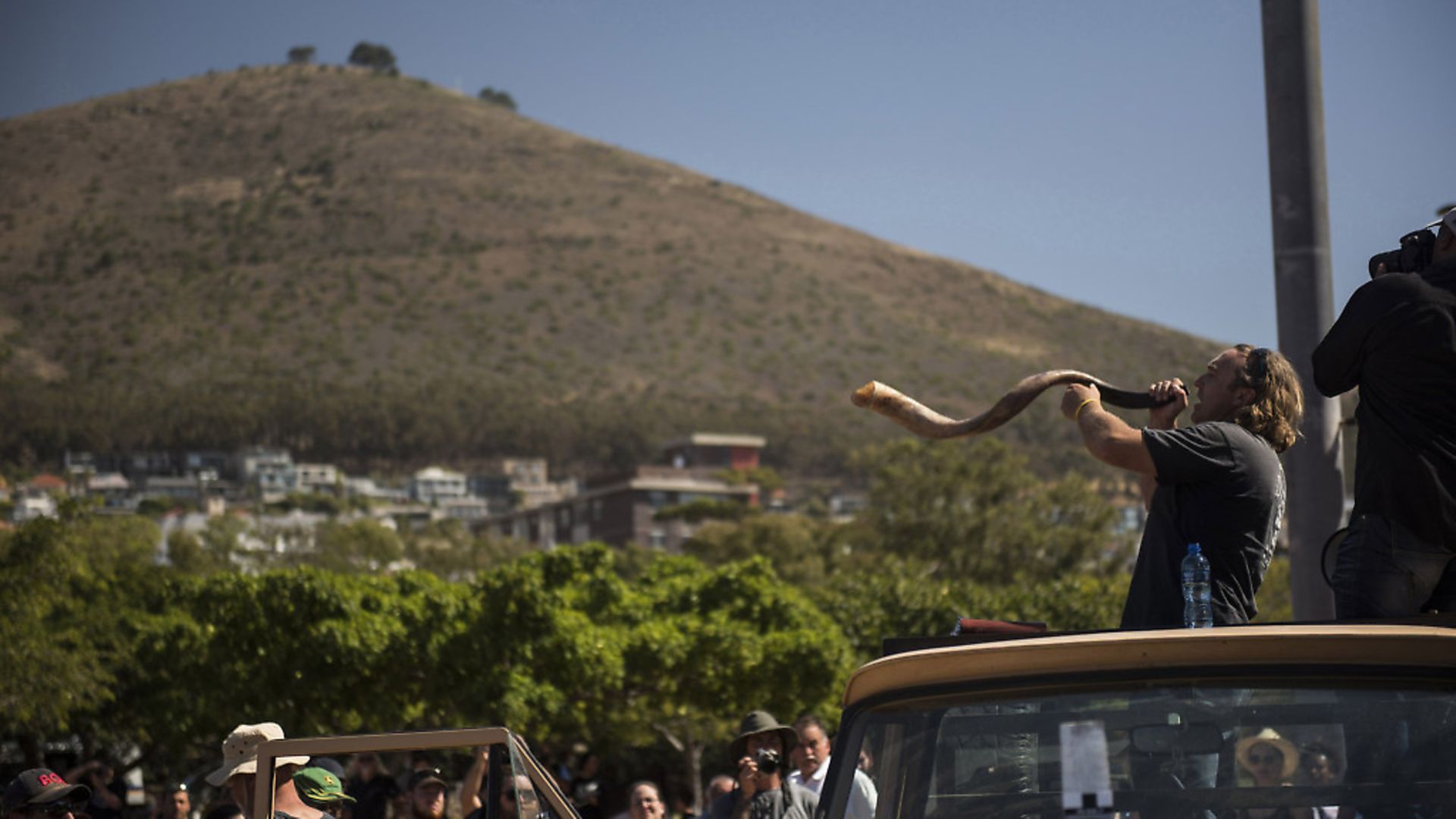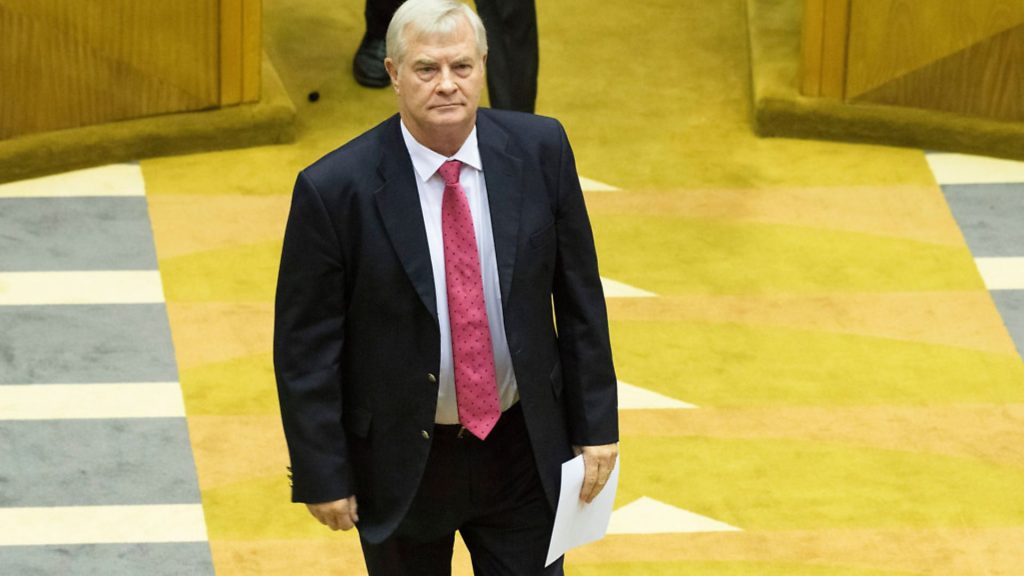
JOE WALSH on how the tragic murders of rural South Africans are being exploited by global extremists.

Paul Nel, a 60-year-old farmer in South Africa’s Free State, was killed outside his home while talking on the phone to police about a suspicious vehicle spotted nearby. When officers arrived they found his body on the front porch with a gunshot wound to his head. They also found that the killer was still on the scene. He had been hiding in the bushes and opened fire on the police as they arrived, killing Constable Vuyani March and wounding a colleague. Other officers returned fire and shot the attacker, who died on his way to hospital.
In South Africa, Nel’s killing is categorised as a ‘farm murder’ – plaasmoorde, in Afrikaans – a term used to describe any killing that takes place on a farm or rural property. Such tragedies are becoming symbolically associated with the country, in the same way that other brutal crimes have become linked to parts of the world – drive-by shootings in South Central LA, for instance, or knife murders in London – and have been garnering media coverage around the globe.
However, the murder of Paul Nel in January, received no such attention in the international press. One reason for this could be that his killer, Coenraad Badenhorst, was white and owned the neighbouring farm to Nel’s. His death, therefore, did not fit the narrative that is habitually applied when it comes to South Africa’s farm murders – that they are part of a campaign by which the country’s once dominant white population has become a victimised minority under attack from the black population which is violently driving them off the land.
This polarising and, as we shall see, deeply misleading version of events is the one being promoted by far-right elements in South Africa – and echoed and amplified by their allies abroad.
One reason for this international resonance of farm murders is South Africa’s long and sad history, whereby land, and its ownership, has been a deeply contested issue. It is certainly a topical one, currently being debated by the country’s parliament. The radical, leftist Economic Freedom Fighters (EFF), with its provocative leader Julius Malema, has long campaigned for land to be taken from the whites and given, or returned, to the black majority. At the elections in May – at which the group’s election slogan was “Our land and jobs, now!” – the EFF increased its vote share from 6.4% to 10.8%. The result was a strong showing for the country’s third largest party, in a poll in which both the governing ANC and opposition Democratic Alliance saw their vote share slip. Even before the vote, and following a parliamentary proposal by Malema, the government had established a committee which has recommended the constitution be amended to allow for expropriation of land without compensation. This amendment to the constitution is likely to be passed by the current parliament.
The prospect is clearly an alarming one for opponents, who say that the proposed changes, and the rhetoric being used, are directly linked to racially-motivated farm murders. There are three main groups in the country who are encouraging this narrative: The survivalist Suidlanders, who spend their time preparing for a coming race war; the Afrikaner organisation AfriForum; and the Freedom Front Plus (VF+), South Africa’s main Afrikaner nationalist political party, which, in the recent election more than doubled its vote share, to 2.38%.
The party’s focus is on getting farm murders declared a ‘priority crime’ for law enforcement. Its leader Pieter Groenewald has spoken in parliament about how farm murders are not an ordinary crime and wants them treated specially. But VF+ has an international agenda too: The party has twice hosted European parliament delegations on fact-finding missions to South Africa to investigate farm murders. The representatives were from the Europe of Nations and Freedom (ENF) grouping in the parliament, which includes France’s Rassemblement National, formerly the Front National, and Italy’s Lega.
VF+ officials have also been to Strasbourg to lobby the EU to take action on the issue. The party stops short of calling for sanctions against South Africa but they do want the EU to have farm murders at the top of the agenda when having any discussions with the country’s government and to push the ANC to label them a priority crime.
AfriForum has also been active in raising the issue up the global agenda. Last year, it sent representatives to the US to campaign on the subject of farm murders. There, they met Trump’s security adviser John Bolton, and featured on a Fox News broadcast about the topic. One of the viewers was Trump himself, who tweeted in response to the show that he had asked his secretary of state to investigate the “large scale killing of farmers”.
Right wing news sites like Breitbart and InfoWars have also pushed South Africa’s farm murders as the biggest story on the continent. Katie Hopkins even travelled to the country to cover the issue for Rebel Media. She has been a particularly prominent figure pushing the far-right narrative. After Theresa May visited South Africa last year, Hopkins tweeted: “Whites are being slaughtered in South Africa & inexplicably Appeaser May chooses to crucify herself.”
“The violent, ethnic cleansing of white farmers by armed, black gangs is infuriating & heartbreaking. And the world doesn’t care. Or at least the mainstream media doesn’t care. Do you?” she added.
On the further extremes of white supremacy – across discussion forums and radio shows, such as Stormfront, American Renaissance and the bluntly-named whitegenocide.info, South Africa’s farm murders are a much discussed topic. Richard Spencer, the American activist and self-styled white nationalist, has declared that “war is currently being waged on South African whites”.
On these far-right fringes, the deaths are being cited as evidence of the so-called white genocide conspiracy theory – the idea that white people are being persecuted and pushed out of their rightful place by other races. According to this theory, immigration will lead to the same processes happening in Europe and elsewhere in the West, as part of what these extremists describe as ‘the great replacement’. In his manifesto, Anders Breivik, the Norwegian far-right terrorist who killed 77 people in 2011, referred to “the genocide of Europeans in South Africa”, which he based on farm murder statistics and blamed on “cultural Marxist ANC rule”. More recently, Brenton Tarrant, who murdered 49 people at two mosques in New Zealand earlier this year, titled his document The Great Replacement and wrote at length about white genocide.
The far-right claim that the issue of farm murders is being ignored by the mainstream media. In fact, it is popular topic for the international press, and while they obviously don’t repeat the white genocide theory, the issue is still reported exclusively though the prism of race. Last month, the Mail Online reported “Another white South African farmer who spoke out about land grabs is shot dead”, while, in May, a headline on the Express website declared: “South Africa horror as white farmer activist beaten to death with hammer”.
The sheer volume of international press coverage that the issue receives is staggering. A quick Google search for the words ‘South Africa farm murder’ returns more than 26 million hits whereas ‘South Africa township murder’ has just 3.4 million results. Yet the latter is a far more common occurrence in South Africa.
In fact, as farm murders have gained more and more international attention, their actual numbers have steadily decreased. Latest figures from the South African Police Services show that there were 62 offences recorded between April 2017 and March 2018. This is down from 67 for 2016 to 2017 and way off the highest figure of 147, when farm murders peaked in 2001. By way of comparison, in just one township, Khayelitsha in the Cape Flats, there were 192 murders last year.
South Africa, as a whole, had more than 20,000 murders for the year, giving it a murder rate of 35.7 people per 100,000. An exact murder rate for farmers is difficult to attain, though Africa Check, a non-profit organisation that verifies media claims, has explored how getting an exact figure can be almost impossible and has demonstrated how easily manipulated the data can be, by those looking to inflate the situation.
Yet, as Nel’s case shows, the killings are not as clear cut as those who promote the issue to emphasise a racial element are making out. South Africa is a comparatively violent country with gaping chasms between rich and poor, as well as other social problems. The police argue that most attacks are motivated purely by a desire to rob farmers. Others, are even less clear cut. In recent weeks, again in the Free State, a white farmer was sentenced for murdering three people and burying them in shallow graves on his game farm. This, again, garnered no international coverage, but was another three farm murders for the statistics, which can then be brandished by those seeking to propagate the idea that the killings are part of a sustained racially-motivated campaign.
These rural deaths are indeed a tragedy, as are all of South Africa’s murders. Also tragic, though, is the way that in a comparatively violent country, these murders are garnering disproportionate attention, and are being exploited to suggest something far more sinister is unfolding.
VF+
The party are a throwback to the days of apartheid and Afrikaner nationalism. Its predecessor Freedom Front was founded in 1994, ahead of the country’s first free elections, by apartheid army general Constand Viljoen, who broke off from the Afrikaner Volksfront (AVF), which he had also founded.
The AVF had opted to disrupt, rather than participate in, those landmark elections in order to establish an Afrikaner homeland state with the right to secede from South Africa, while Freedom Front decided to negotiate with the ANC towards the same end.
Today VF+ uses similar language to white nationalist and far-right organisations across the globe, of whites being a persecuted minority that are going to be replaced and need to defend their culture and lives from encroachment.
Following their recent election success, leader Pieter Groenewald asserted Afrikaners are “tired of taking the blame” for everything that’s wrong with the country. He had previously criticised another political party for not wanting white nationalists.
The party’s slogan “hit back, now or never” – more often than not in Afrikaans “slaan terug, noi o nout” – makes it quite clear how it feels about the direction of the multiracial rainbow nation and how Afrikaners are being treated.
The party positions itself as an advocate for minority rights, preservation of culture and identity for all minority groups in South Africa. Though its mission statement makes it quite clear its focus is the promotion of Afrikaner interests and recognising their right to self-determination, territorial or otherwise.
Although VF+’s recent electoral success may be small, they secured just 2.38% of the national vote, it was still the highest share they have seen and saw them receive 414,864 votes.
This means they have returned 10 MPs to the Cape Town parliament including Wynand Boshoff, grandson of Hendrik Verwoerd, prime minister of South Africa from 1958 to 1966 and dubbed the architect of apartheid for his role in shaping and implementing the racial system that defined the country.
Boshoff’s father was the founder of Orania, the controversial Afrikaner only town of which he is a resident and his brother is now the president. Officially the town’s position is it’s not whites-only, but for those wishing preserving Afrikaner culture and language and theoretically a non-white person willing to assimilate could move there. In its 29 years of existence no non-white person has tested this out.
Boshoff argues that he doesn’t think he should be judged on who his grandfather was, but also added: “I will not distance myself from who my parents or grandparents are.”









